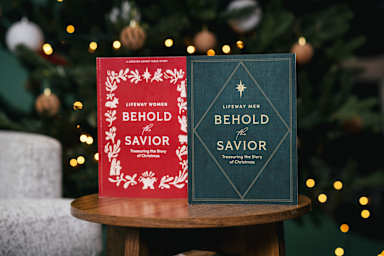When I was growing up, I had a few friends whose families waited until December 23rd to put their Christmas tree up. I thought they were crazy. Why would you want to deprive yourself of the festivities for so long?
Not me. I wanted to get in all the celebrating I could during the weeks leading up to Christmas. I'm talking Buddy the Elf levels of yuletide cheer. Christmas was my favorite time of year and I turned it into a month-long party. The decorations, the food, the movies and TV specials—I was there for all of it. But it wasn't just about the commercialized stuff; celebrating the birth of Jesus Christ truly was at the heart of my love for Christmas. My parents were gospel-centered before being gospel-centered was cool and they raised my brother and I to appreciate the true meaning of Christmas, faithfully showing us the redemptive beauty of that baby in the manger. We knew how to keep Christmas well.
But as the years went by, I began to notice something surprising: Christmas Day was a bit of a let down. Not because the gifts were bad or the day wasn't fun—we always had a great time. The let down came because, after a solid month of festivities, I was tired of celebrating. There was something anticlimactic about spending the day commemorating something in which I had already been immersed for weeks. I remember waking up on Christmas morning with the nagging feeling that it was time to move on.
It took me a while to catch on, but I eventually understood what that nagging feeling was telling me: I'm not cut out for unending celebration. It's not natural. As God's people, we live in a fallen world pulsing with rhythms of mourning and joy, exile and restoration, rebellion and redemption. In order to appreciate the bounty of the feast, we need to have some contrasting seasons of fasting. For the good news of Jesus' birth to be truly feast-worthy, it's helpful to spend some time considering why he came in the first place—to save a world broken by sin. In a word, we need Advent.
Before we unleash the joyful revelry of Christmas Day, Advent is a brief season that readies our hearts for the celebration. It reminds us that there was a time before the feast, a time when one could only imagine being invited to the King's banquet table. It calls to mind the longing and anticipation of God's people as they awaited the promised Messiah, and helps us hone those same sentiments as we await his second coming.
This doesn't mean that my home is draped in somber tones for the whole month of December. We still put up the Christmas tree, hang the decorations, and eat the cookies. Observing Advent is not primarily about what we do or don't do, it's about reorienting our hearts around a hope-filled expectation. The specifics of how we do this will differ in each home, and that's okay.
In my home, carols heralding the birth of the Savior aren't banned, but we do make an effort to sing O Come, O Come, Emmanuel and Come, Thou Long-Expected Jesus a bit more often.
Before we rejoice over the birth of Jesus in Luke 2 on Christmas morning, we spend the weeks of Advent together in family worship looking at Old Testament prophecies that foretold of it.
We read stories that help our children imagine what it must have been like for generations of God's people to wait for His arrival.
We have plenty of holiday fun, but we hold back the floodgates of celebration while fostering a sense of holy anticipation.
In our home, keeping Advent makes the Christmas feast all the more satisfying.
In the weeks leading up to Christmas, let me encourage you not to skip over the anticipation in order to get right to the celebration. Let the expectation simmer. Feel the gravity of the wait, the angst of knowing this world is not as it should be, and the longing for all things to be made right in Christ. Wake up on Christmas morning with a hard-fought hope grown out of a rich season of spiritual preparation. That's what Advent is all about.

